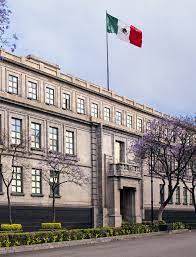
Mexico’s Supreme Court (pictured above) rules ban on recreational cannabis unconstitutional. Photo Credit: Supreme Court of Mexico Visitor’s Guide.
On June 29th, 2021, Mexico’s Supreme Court ruled that the laws prohibiting the use of recreational cannabis are unconstitutional.
As a result, adults who want to grow and consume their own cannabis can apply for permits from the country’s health secretariat. However, the criminal penalties for having more than 5 grams of weed or selling the drug will continue to exist.
The Guardian states that the court’s ruling moves the country even closer to cannabis legalization. The decision not only paves the way for Mexico to become one of the world’s biggest legal cannabis markets; but it also encourages lawmakers in the U.S. to federally legalize cannabis.
What Encouraged the Judges’ Decision?
Before the court’s decision, adults in Mexico were able to petition courts for individual decrees to grow and consume cannabis.
More specifically, The Guardian mentions that “the supreme court first granted injunctions in 2015 in favour of four applicants seeking injunctions to consume and grow marijuana.” In other words, the applicants in this case wanted to gain legal permission to use cannabis.
By 2017, the supreme court ordered congress to create a legal cannabis market. Then, in 2018, the court determined it unconstitutional to have a law criminalizing adults who privately use and cultivate cannabis.
At that time, the majority of judges believed that “the effects caused by marijuana do not create an absolute prohibition on its consumption,” reports NORML.
Finally, In 2019, the court ruled that prohibiting use of the plant was unconstitutional. AP News states that lawmakers had until this past April 30th to pass a contrary law. They ended up extending this decision, first into March, where the lower house approved a cannabis legalization bill that didn’t make it through the Senate. Then, it was prolonged until the court voted on the most recent bill on June 29th with an 8-3 win.
Post from @balca_bayarea in Instagram.
What it Means for Mexican Citizens
The court voted with a majority in favor of legal cannabis use. This vote is what decided how cannabis will be used in the future.
NORML shares that “The 8-3 vote means that marijuana possession and cultivation for personal use will be legal nationally if the person has a permit.”
The new law would require that individuals have a permit to grow plants for their personal use.
AP News relays that “each individual [that has a permit] would be allowed to have six plants, with a maximum of eight per household.”
While the court’s decision opens up the opportunity to grow and possess the plant; it also presents a chance to curb the illicit market. In fact, “lawmakers favoring the bill say it will move the marijuana market out of the hands of Mexico’s powerful drug cartels to the government,” AP News further reports.
Post from @latinascannapreneurs on Instagram.
What Could it Mean for the U.S.?
In the U.S., it seems one member of the Supreme Court may also agree that cannabis prohibition is unconstitutional.
NORML reports that on June 29th, 2021, “U.S. Supreme Court Justice Clarence Thomas issued an opinion questioning the legal rationale for continuing federal marijuana prohibition in the United States.”
The federal law that prohibited the state-sanctioned use of marajuana as a medicine has been in effect since 2005. Thomas mentioned that times have changed significantly since then, and that officials need to amend them.
Thomas acknowledges that “the federal government’s current approach is a half-in, half-out regime that simultaneously tolerates and forbids local use of marijuana.” Their position is not clear; that is why he believes it needs an update.
Some industry experts, like Jordan Lewis with Fotmer Life Sciences, believe “[…] the probability of Mexican legalization is already forcing U.S. lawmakers into considering national legalization,” he tells Leafly in January, 2021.
Additionally, Lewis notes that “it’s hard to maintain a prohibitionist policy towards cannabis when not only the majority of states have legal programs, but when the north and south neighboring countries will soon have cannabis legalization as well,” he adds. “So I think it creates a stark reality that the U.S. is going to have to deal with.”
In the meantime, federal legalization in America remains uncertain as many states, and Democrat lawmakers push for drug policy reform. Currently, congress members including Sen. Chuck Schumer, Sen. Cory Booker and Sen. Bernie Sanders have called for federal legalization, and support legislation including a bill to allows banks to work with cannabis companies. While President Biden is unlikely to support federal legalization — and while legislation remains stalled in Congress —America’s neighbors are pushing ahead with policies that are friendlier to businesses and consumers.


One (Mexico legalization) has nothing to do with the other (US keeping it Schedule 1). This is so naïve.